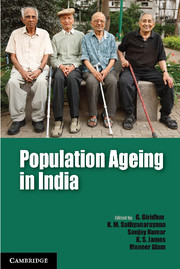Book contents
- Frontmatter
- Contents
- List of Figures
- List of Tables
- Preface
- Acknowledgements
- Introduction
- 1 Demographics of Population Ageing in India
- 2 Elderly Workforce Participation, Wage Differentials and Contribution to Household Income
- 3 Living Arrangements of Elderly in India: Policy and Programmatic Implications
- 4 Health Status of Elderly in India: Trends and Differentials
- 5 The National Policy for Older Persons: Critical Issues in Implementation
- 6 Policy Initiatives on Population Ageing in Select Asian Countries and Their Relevance to the Indian Context
- 7 Studies on Ageing in India: A Review
- Contributors
- Index
1 - Demographics of Population Ageing in India
Published online by Cambridge University Press: 05 August 2014
- Frontmatter
- Contents
- List of Figures
- List of Tables
- Preface
- Acknowledgements
- Introduction
- 1 Demographics of Population Ageing in India
- 2 Elderly Workforce Participation, Wage Differentials and Contribution to Household Income
- 3 Living Arrangements of Elderly in India: Policy and Programmatic Implications
- 4 Health Status of Elderly in India: Trends and Differentials
- 5 The National Policy for Older Persons: Critical Issues in Implementation
- 6 Policy Initiatives on Population Ageing in Select Asian Countries and Their Relevance to the Indian Context
- 7 Studies on Ageing in India: A Review
- Contributors
- Index
Summary
Introduction
A major emerging demographic issue of the twenty-first century is the ageing of populations as an inevitable consequence of the demographic transition experienced by most countries. Across the world, declining fertility and increased longevity have resulted in higher numbers and proportions of older persons 60 years and above. This trend is expected to continue as the estimated 737 million older persons in 2009 (United Nations, 2009) were projected to increase to 2 billion by 2050 at which time the proportion of the population age 60+ years will outnumber the proportion of the population who are children (of 0–14 years age). The oldest-old age segment (80 years and above) is the fastest growing segment and by 2050 about 20 per cent of older persons will be 80 years and above. The coming decades therefore will be characterized by the ageing of the aged. Of particular relevance is the fact that in 2009 two-thirds of the world's older persons lived in developing countries (55 per cent in Asia alone), regions that are much less prepared to deal with this aspect of population dynamics compared to more developed countries. The ageing of populations has significant implications for older persons themselves, as well as the families and societies they live in. This recognition resulted in the World Assembly on Ageing being held in 2002 with 159 countries adopting the Madrid Plan of Action on Ageing (MPAA) which focuses on how the needs of older persons can be mainstreamed into development.
- Type
- Chapter
- Information
- Population Ageing in India , pp. 1 - 41Publisher: Cambridge University PressPrint publication year: 2014
- 21
- Cited by



